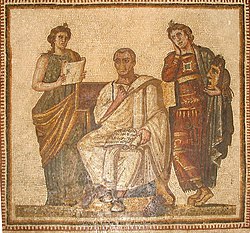Vergil, Aeneid 1.203
“Perhaps someday it will bring pleasure to recall these things.”
forsan et haec olim meminisse iuvabit.
Servius, Commentary on Vergil’s Aeneid 1.203
“And many report that “it will please” does not mean “it will bring pleasure” but it will be of some use”
et multi ‘iuvabit’ non delectabit, sed usus erit tradunt.
Seneca, EM 58.5-6
“If someone beset by troubles should say, “Perhaps someday it will bring pleasure to recall these things,” then let this person fight with their whole spirit. We are conquered if we yield; if we push back against our grief, we prevail.”
In ipsis positus difficultatibus dicat: Forsan et haec olim meminisse iuvabit. Toto contra ille pugnet animo; vincetur, si cesserit, vincet, si se contra dolorem suum intenderit.
Macrobius, Saturnalia 5.6-8
[comparing Vergil to Homer]
Hom. Od 12.208-12
“Friends, we are in no way unfamiliar with troubles:
This is indeed no greater a suffering than that time
When the Kyklops trapped us in his cave with violent force.
But we got out of there too thanks to my courage, planning,
And wit, and I think you will some how remember these things.”
Ulysses reminds his companions of only one reason for their pain while Aeneas reminds them of the results of two catastrophes in order to urge them to have hope for release from their current troubles. Ulysses is pretty indirect in saying “I think you will somehow remember these things” while Aeneas is clearer when he says “Perhaps someday it will bring pleasure to recall these things”.
But what your poet also adds here is a stronger kind of reassurance when he asks people not only to think of a time when they survived but to have hope as well for happiness in the future by promising that following their current labors they will find not only a safe home but a kingdom.”
ὦ φίλοι, οὐ γάρ πώ τι κακῶν ἀδαήμονές εἰμεν·
οὐ μὲν δὴ τόδε μεῖζον ἔπι κακόν, ἠ᾿ ὅτε Κύκλωψ
εἴλει ἐνὶ σπῆϊ γλαφυρῷ κρατερῆφι βίηφν·
ἀλλὰ καὶ ἔνθεν ἐμῇ ἀρετῇ βουλῇ τε νόῳ τε
ἐκφύγομεν, καί που τῶνδε μνήσεσθαι ὀΐω.
-
- Vlixes ad socios unam commemoravit aerumnam: hic ad sperandam praesentis mali absolutionem gemini casus hortatur eventu. deinde ille obscurius dixit,
. . . καί που τῶνδε μνήσεσθαι ὀΐω.
hic apertius,
. . . forsan et haec olim meminisse iuvabit.
-
- ‘Sed et hoc quod vester adiecit solacii fortioris est. suos enim non tantum exemplo evadendi, sed et spe futurae felicitatis animavit, per hos labores non solum sedes quietas sed et regna promittens.
Homer, Odyssey 15.398-401
“As we two drink and dine in this shelter
Let us take pleasure as we recall one another’s terrible pains.
For a man finds pleasure even in pains later on
After he has suffered so very many and survived many too.”
νῶϊ δ’ ἐνὶ κλισίῃ πίνοντέ τε δαινυμένω τε
κήδεσιν ἀλλήλων τερπώμεθα λευγαλέοισι
μνωομένω· μετὰ γάρ τε καὶ ἄλγεσι τέρπεται ἀνήρ,
ὅς τις δὴ μάλα πολλὰ πάθῃ καὶ πόλλ’ ἐπαληθῇ.
Theognis, 1047-1048
“For now, let us take pleasure in drinking, and telling fine tales
The gods can worry over whatever will happen in the future.”
νῦν μὲν πίνοντες τερπώμεθα, καλὰ λέγοντες·
ἅσσα δ᾿ ἔπειτ᾿ ἔσται, ταῦτα θεοῖσι μέλει.
Schol. BQ ad Od. 15.399 ex
“Let us take pleasure in one another’s pains”—for a person among afflictions delights in terrible narratives and in hearing another person tell his own troubles.”
κήδεσιν ἀλλήλων τερπώμεθα] καὶ ἐν ταῖς δειναῖς διηγήσεσι τέρπεται ἀνὴρ ὢν ἐν θλίψεσι καὶ ἀκούων ἑτέρου λέγοντος τὰ ἑαυτοῦ ἄλγεα.
Shepherd of Hermas, Parables 4
“One who changes their ways must torture their own soul and become resolutely humble in every act and afflict themself with many varied afflictions.”
ἀλλὰ δεῖ τὸν μετανοοῦντα βασανίσαι τὴν ἑαυτοῦ ψυχὴν καὶ ταπεινοφρονῆσαι ἐν ἁπάσῃ τῇ πράξει αὐτοῦ ἰσχυρῶς καὶ θλιβῆναι ἐν πολλαῖς θλίψεσι καὶ ποικίλαις












